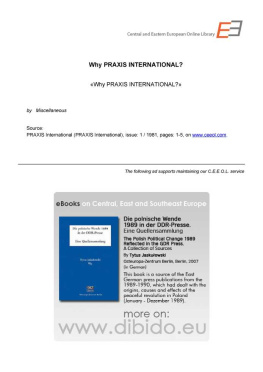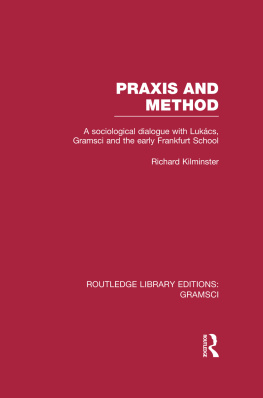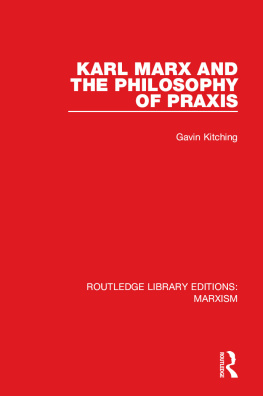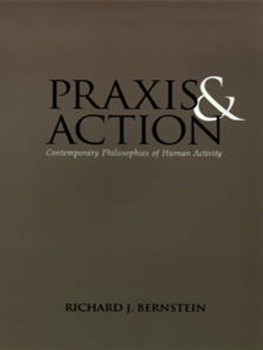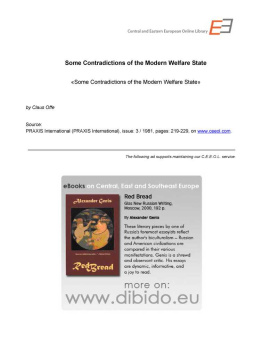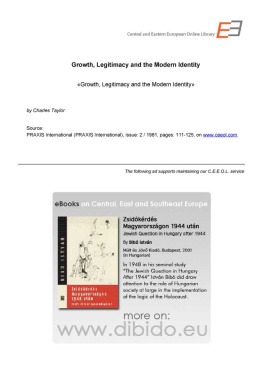WHY PRAXIS INTERNATIONAL?
At the moment there is no international journal of Marxist humanist orientation, despite the increasing urgency for it, and despite the fact that the progressive movements in the 1960s brought to life a whole generation of young intellectuals and social scholars who re-opened basic issues of Marxs theory and the contemporary world. Such a journal can play a decisive integrative role, it can provide an indispensable level of mutual communication and dialogue, it can encourage the development of a systematic critical consciousness about the essential limitations of present day societies, and about optimal historical possibilities for human emancipation.
These needs can be met by Praxis International, a journal that will seek to carry on the spirit and work of the Yugoslav journal Praxis in the new historical conditions of the 1980s, and on a larger international scale, in all those countries where progressive intellectuals and independent critical Marxists share similar aspirations and commitments.
The publication of Praxis which began in 1964 has become impossible in Yugoslavia since 1975. Although the theoretical orientation of Praxis was always clearly Marxist and its commitment to democratic socialism explicit, the journal came under increasingly strong attack by political authorities. The journals critique of the limitations of Yugoslav society, including existing bureaucratic structures, social inequalities and excessive reliance on a market economy, was condemned as unacceptable political activity, and as destructive criticism. Both the journal and the summer school at Korcula associated with it were stopped in early 1975, but the community of Praxis continues to function, and hopes to resume publication of the journal under more favorable conditions in Yugoslavia.
The critical philosophy generated by Praxis, and by independent intellectuals in other countries, continues to be developed and refined regardless of the political conditions in any individual country. No amount of repression can kill a substantive and relevant critical orientation; it dies only when it exhausts its creative potential. While continuing in the same spirit and including many of the editors and contributors to Praxis, the new journal Praxis International is confronted with a different historical situation and essentially different tasks.
One of the most important tasks during the 1960s was the affirmation of authentic Marxist thought in its dialectical and humanist character in opposition to dogmatic, apologetic and Stalinist distortions. It was a period of great turmoil, of unsuspected practical possibilities, and of a growing realization of the utter inadequacy of official forms of Marxism. Dogmatic forms of Marxism were entirely inapplicable for understanding and critically assessing such complex events and processes as the spontaneous French working class movement in May 1968, the student movements and protests throughout the world, the defeat of the leading military superpower in Vietnam, the Prague Spring, and the military invasion of Czechoslovakia by the Soviet Union, workers demands for participation and self-government, the growth of the womens liberation movement, and the recognition of the rights of ethnic minorities. All of these events and movements shared in common a demand for human emancipation, and a refusal to accept unjust, oppressive and authoritarian forms of social life whether labeled capitalist or socialist.
During this period a general philosophical and social theory needed to focus not only on the relentless criticism of existing institutions, but also on all those ideological tendencies that sought to preclude the possibility of critical theory. It needed to understand the new emancipatory movements, their deeper historical meaning, and the strengths and weaknesses of these trends. Praxis contributed to the development of such a theory. Although it gave a high priority to the open discussion of specific issues in Yugoslav society, it had a general theoretical character from the start, encouraging discussion of such fundamental issues as: the meaning and prospects for socialism, human freedom, equality, the analysis of history, reification, creativity, the nature of social revolution, bureaucracy and technology in the contemporary world.
Working on such issues, Praxis has helped to restore the creative potential of Marxism. It drew inspiration from the works of Gramsci, Korsch, Lukcs, Bloch, Marcuse, Fromm and Goldmann. The latter four contributed to Praxis and participated in the Korcula summer school. Both the journal and the summer school became a focal point where independent East European and Western intellectuals could freely exchange views and explore themes that were emerging in the 1960s.
Historical conditions have changed during the 1970s, and demand a different type of response. Throughout much of the world, conservative and reactionary forces have been able to gain the upper hand - at least temporarily. Progressive intellectuals have come under increasing attack and repression. Many of the emancipatory movements of the 1960s have become diffuse and disorganized. The results of the 1960s were powerful enough to expose the social forms of repression, violence and domination. However, they were not sufficiently deep, enlightened and passionate to produce genuine socialist changes. But the crisis is far from being over. Its forms and causes are more complex than those of earlier crises, and we are confronting a new type of crisis situation.
The upheavals in the 1960s indicated that there is a deep legitimation crisis of political power. They signified the beginning of a lasting process of erosion of the ideologies which were used to justify virtually unrestrained use of coercive power in national and international politics. It has become evident that the immense dominating power of existing social systems is inextricably combined with a growing vulnerability and impotence. Existing social systems meet with several kinds of impediments. They confront an awakened, resistant Third World whose basic demands for genuine autonomy are legitimate even when they are compromised by nationalist, racial or religious biases. Furthermore, a point has been reached where old ideological clichs are beginning to lose their earlier credibility, and fail to secure consent to unjust policies. This is happening at a time when the advanced industrial powers - more than ever since the Second
World War - require aggressive policies in order to continue exponential economic growth.
An entire epoch of the development of material production based on cheap labor and on apparently unlimited, easily available natural resources is now approaching its end. The mode of production based on the necessity of accelerated increase of material output and material consumption presupposed unlimited wealth of resources, unlimited pollution of the natural environment, and a widespread acceptance of a manipulated market in the sale and distribution of goods. With the growing awareness of the falsity of such premises, there is also a growing recognition of the need for restructuring the entire economy and lifestyle in advanced industrial countries. This is no longer merely a crisis of overproduction which can be resolved by state intervention within the existing social framework. This is no longer a crisis caused by the inability of society to continue to develop productive forces. This is a crisis of a society which can develop productive forces - and indeed in a most impressive way - but for only one primary purpose: accelerated growth of material output and increasingly wasteful consumption.
We are entering into a new era in which irrational profit-oriented production will have to be replaced, and in which the development of human productive power desperately needs to be liberated from alienated labor in order to satisfy a variety of human needs. Such a demand for a revolutionary change in the nature and purpose of human work and human communities requires a profound transformation of social institutions and individual lifestyles. It requires the democratization and humanization of all aspects of social life. Even those who are defenders of the status quo are beginning to realize that unless there are basic changes in existing social institutions, we will be confronted with dangerous, ominous consequences for the human prospect. Just at a time when on the surface there appears to be political stability, there are many signs of a slow but consequential drift into an uncertain process of dysfunction, decay of social, economic and political institutions, and moral disintegration.

